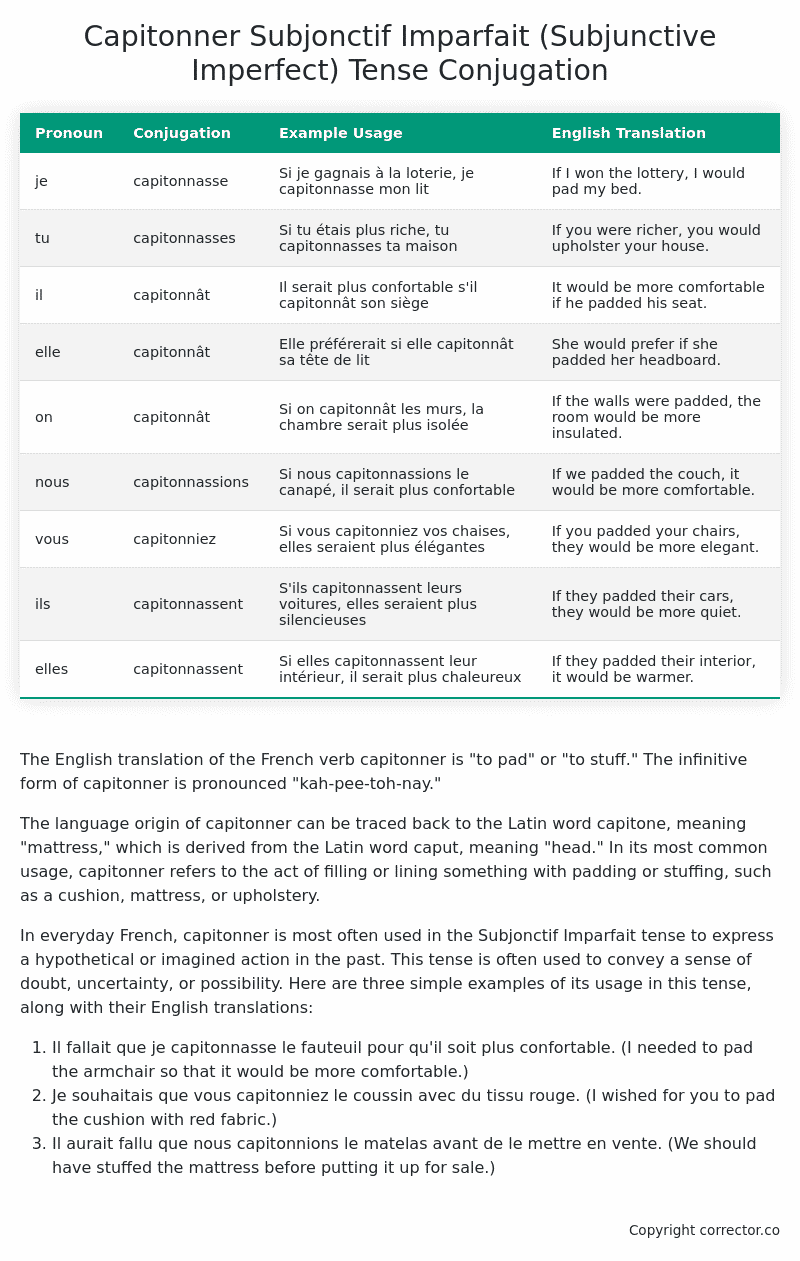Subjonctif Imparfait (Subjunctive Imperfect) Tense Conjugation of the French Verb capitonner
Introduction to the verb capitonner
The English translation of the French verb capitonner is “to pad” or “to stuff.” The infinitive form of capitonner is pronounced “kah-pee-toh-nay.”
The language origin of capitonner can be traced back to the Latin word capitone, meaning “mattress,” which is derived from the Latin word caput, meaning “head.” In its most common usage, capitonner refers to the act of filling or lining something with padding or stuffing, such as a cushion, mattress, or upholstery.
In everyday French, capitonner is most often used in the Subjonctif Imparfait tense to express a hypothetical or imagined action in the past. This tense is often used to convey a sense of doubt, uncertainty, or possibility. Here are three simple examples of its usage in this tense, along with their English translations:
- Il fallait que je capitonnasse le fauteuil pour qu’il soit plus confortable. (I needed to pad the armchair so that it would be more comfortable.)
- Je souhaitais que vous capitonniez le coussin avec du tissu rouge. (I wished for you to pad the cushion with red fabric.)
- Il aurait fallu que nous capitonnions le matelas avant de le mettre en vente. (We should have stuffed the mattress before putting it up for sale.)
Table of the Subjonctif Imparfait (Subjunctive Imperfect) Tense Conjugation of capitonner
| Pronoun | Conjugation | Example Usage | English Translation |
|---|---|---|---|
| je | capitonnasse | Si je gagnais à la loterie, je capitonnasse mon lit | If I won the lottery, I would pad my bed. |
| tu | capitonnasses | Si tu étais plus riche, tu capitonnasses ta maison | If you were richer, you would upholster your house. |
| il | capitonnât | Il serait plus confortable s’il capitonnât son siège | It would be more comfortable if he padded his seat. |
| elle | capitonnât | Elle préférerait si elle capitonnât sa tête de lit | She would prefer if she padded her headboard. |
| on | capitonnât | Si on capitonnât les murs, la chambre serait plus isolée | If the walls were padded, the room would be more insulated. |
| nous | capitonnassions | Si nous capitonnassions le canapé, il serait plus confortable | If we padded the couch, it would be more comfortable. |
| vous | capitonniez | Si vous capitonniez vos chaises, elles seraient plus élégantes | If you padded your chairs, they would be more elegant. |
| ils | capitonnassent | S’ils capitonnassent leurs voitures, elles seraient plus silencieuses | If they padded their cars, they would be more quiet. |
| elles | capitonnassent | Si elles capitonnassent leur intérieur, il serait plus chaleureux | If they padded their interior, it would be warmer. |
Other Conjugations for Capitonner.
Le Present (Present Tense) Conjugation of the French Verb capitonner
Imparfait (Imperfect) Tense Conjugation of the French Verb capitonner
Passé Simple (Simple Past) Tense Conjugation of the French Verb capitonner
Passé Composé (Present Perfect) Tense Conjugation of the French Verb capitonner
Futur Simple (Simple Future) Tense Conjugation of the French Verb capitonner
Futur Proche (Near Future) Tense Conjugation of the French Verb capitonner
Plus-que-parfait (Pluperfect) Tense Conjugation of the French Verb capitonner
Passé Antérieur (Past Anterior) Tense Conjugation of the French Verb capitonner
Futur Antérieur (Future Anterior) Tense Conjugation of the French Verb capitonner
Subjonctif Présent (Subjunctive Present) Tense Conjugation of the French Verb capitonner
Subjonctif Passé (Subjunctive Past) Tense Conjugation of the French Verb capitonner
Subjonctif Imparfait (Subjunctive Imperfect) Tense Conjugation of the French Verb capitonner (this article)
Subjonctif Plus-que-parfait (Subjunctive Pluperfect) Tense Conjugation of the French Verb capitonner
Conditionnel Présent (Conditional Present) Tense Conjugation of the French Verb capitonner
Conditionnel Passé (Conditional Past) Tense Conjugation of the French Verb capitonner
L’impératif Présent (Imperative Present) Tense Conjugation of the French Verb capitonner
L’infinitif Présent (Infinitive Present) Tense Conjugation of the French Verb capitonner
Struggling with French verbs or the language in general? Why not use our free French Grammar Checker – no registration required!
Get a FREE Download Study Sheet of this Conjugation 🔥
Simply right click the image below, click “save image” and get your free reference for the capitonner Subjonctif Imparfait tense conjugation!

Capitonner – About the French Subjonctif Imparfait (Subjunctive Imperfect) Tense
Formation
Common Everyday Usage Patterns
Interactions with Other Tenses
Subjonctif Présent
Indicatif Passé Composé
Conditional
Conditional Perfect
Summary
I hope you enjoyed this article on the verb capitonner. Still in a learning mood? Check out another TOTALLY random French verb conjugation!


